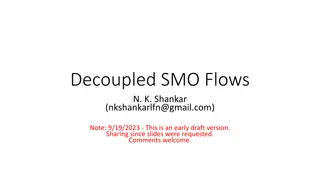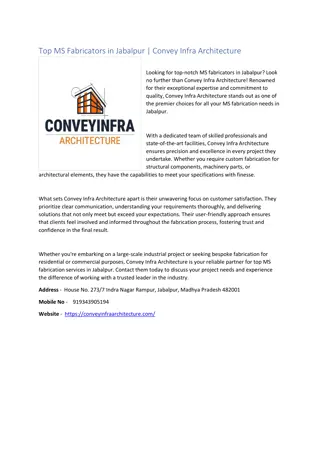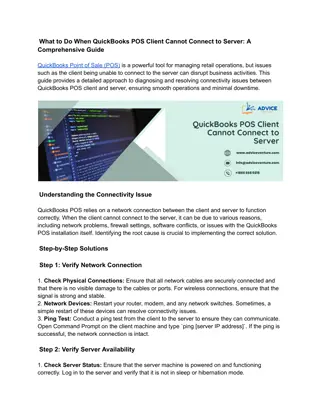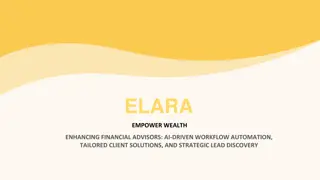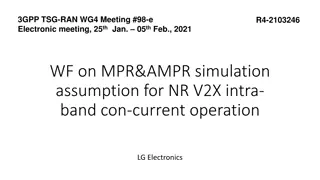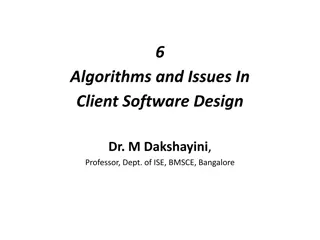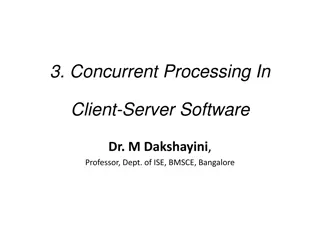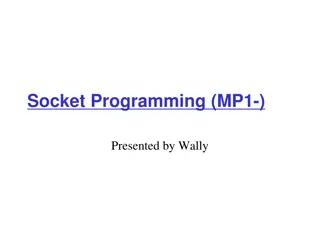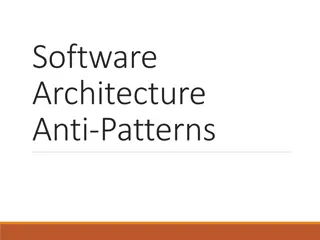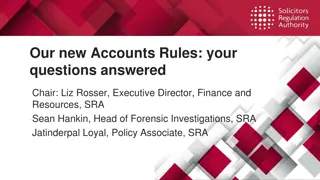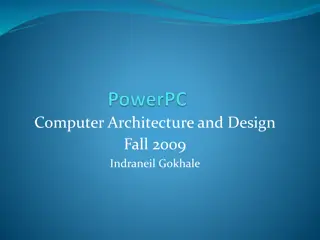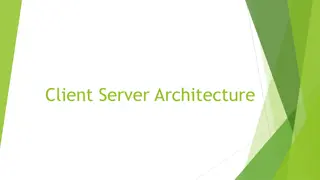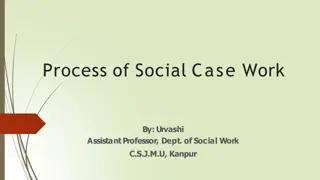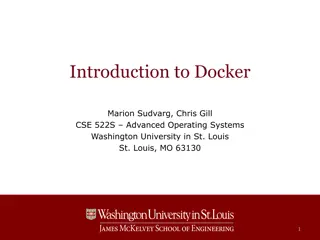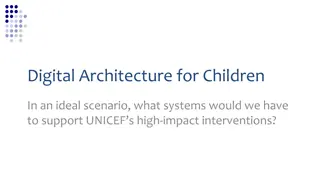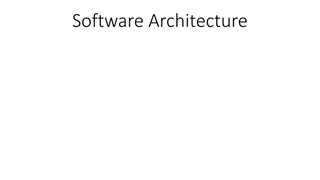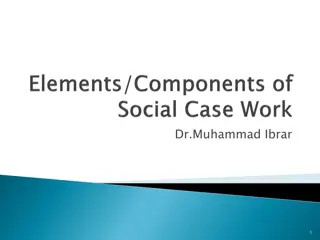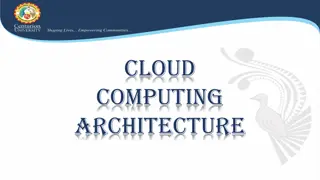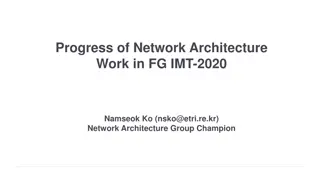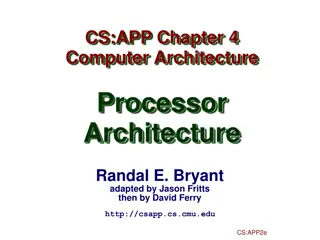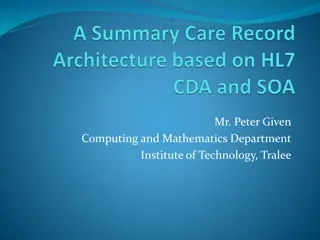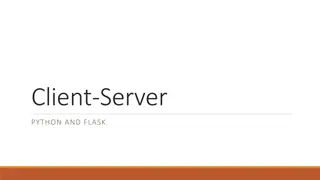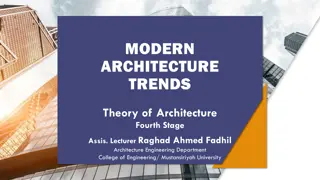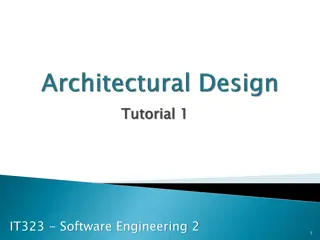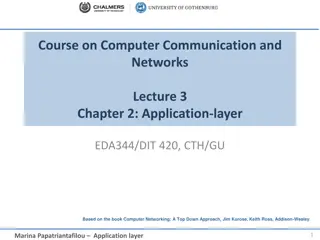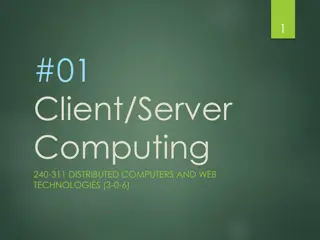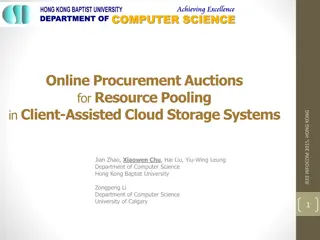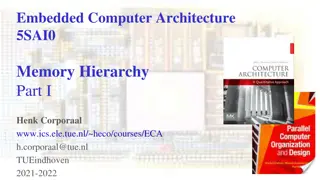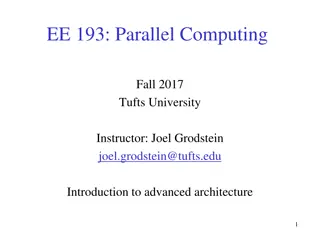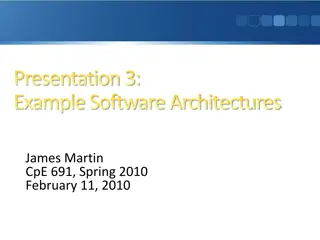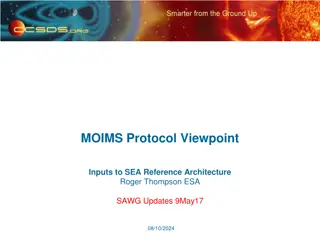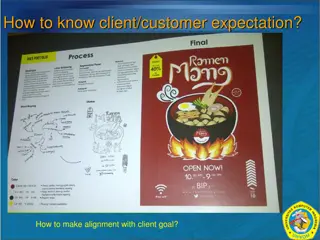Understanding Computer Organization and Architecture
A computer system is a programmable digital electronics device that processes data as per program instructions to provide meaningful output. It comprises hardware and software components, with hardware being the physical parts and software essential for driving the hardware. Computer organization fo
14 views • 71 slides
Enhancing Customer Loyalty with UNIO's Real Infrastructure of Client Benefits
UNIO offers a comprehensive infrastructure of client benefits and motivation to increase customer loyalty. Their system includes unique features such as money-back promotions, prizes, and a lower client migration rate. By working alongside international loyalty systems and partnering with NEO Bank U
0 views • 7 slides
Decoupled SMO Architecture Overview
Develop flows showing interaction between SMO modules in the context of open-source architecture using OSC, ONAP, and other code. The objective is to align open-source work with O-RAN trends, improve synergy, reduce duplication, and provide feedback to O-RAN discussions. Related work includes Decoup
4 views • 27 slides
Top MS Fabricators in Jabalpur | Convey Infra Architecture
Convey Infra Architecture, led by Alok Tiwari, stands out as one of the top MS fabricators in Jabalpur. With a commitment to precision and quality, their expertise in metal fabrication is unmatched. From intricate designs to large-scale projects, they ensure seamless execution and durable results. A
4 views • 1 slides
Best 10 Strategies to Build Effective Client Relationship Management
Building effective client relationship management (CRM) is crucial for businesses to foster lasting connections with their clients. Let\u2019s explore 10 strategies that can help you create meaningful and enduring relationships with your clients:\n\/\/homedecorationstyle.mypagecloud.com\/blog\/best-
2 views • 12 slides
What to Do When QuickBooks POS Client Cannot Connect to Server_ A Comprehensive Guide
Struggling with QuickBooks POS client connectivity issues? Our comprehensive guide offers detailed steps to resolve problems when QuickBooks POS client cannot connect to the server. Learn how to check network connections, configure firewall settings, and verify server configurations to restore seaml
1 views • 3 slides
Revolutionizing Financial Advising with Elara: AI-Driven Solutions for Wealth Enhancement
Elara is an AI-powered assistant revolutionizing financial advising by streamlining operations, improving client engagement, and accelerating lead generation for wealth managers. With a focus on automation and personalization, Elara addresses challenges faced by financial advisors, leveraging data f
2 views • 12 slides
Overview of RF Architecture and Waveform Assumptions for NR V2X Intra-Band Operation
In the electronic meeting of 3GPP TSG-RAN-WG4, discussions were held on the RF architecture and waveform assumptions for NR V2X intra-band operation in band n79. Various options and recommendations were presented regarding RF architecture, antenna architecture, and waveform definitions for efficient
1 views • 7 slides
Algorithms and Issues in Client Software Design
Explore the fundamentals of client software design, including the underlying algorithms, client architecture, and methods for identifying server locations. Learn how applications become clients, interact with TCP/IP protocols, and simplify client-side operations compared to server software.
5 views • 49 slides
Understanding Concurrent Processing in Client-Server Software
Concurrency in client-server software involves simultaneous computing processes among multiple users or processes within a network. Dr. M. Dakshayini explains the importance of concurrency in distributed computing and its various forms such as time-sharing and multiprocessing. The design and impleme
3 views • 26 slides
Understanding Computer Architecture and Organization
Computer architecture and organization are fundamental aspects of computing systems. Computer architecture focuses on the functional design and implementation of various computer parts, while computer organization deals with how operational attributes come together to realize the architectural speci
3 views • 40 slides
Introduction to Socket Programming for Client/Server Applications
Gain insights into socket programming for building client/server applications that communicate using the Socket API. Explore the fundamentals of TCP sockets, application layers, terminology, and client/server socket interactions. Understand how sockets serve as doors between application processes an
3 views • 15 slides
Common Software Architecture Anti-Patterns
Anti-patterns in software architecture are commonly occurring solutions to problems that lead to negative consequences. These arise due to insufficient knowledge or experience, misuse of design patterns, and lack of attention to evolving project architecture. Examples include Jumble, Stovepipe, Spag
1 views • 7 slides
New Accounts Rules and Client Money Safeguarding Overview
Explore the latest SRA Accounts Rules introduced on 25th November, emphasizing clearer standards, a revised definition of client money, and requirements for safeguarding and managing client funds. Understand the obligations and key considerations in handling client money to ensure compliance and fin
1 views • 26 slides
PowerPC Architecture Overview and Evolution
PowerPC is a RISC instruction set architecture developed by IBM in collaboration with Apple and Motorola in the early 1990s. It is based on IBM's POWER architecture, offering both 32-bit and 64-bit processors popular in embedded systems. The architecture emphasizes a reduced set of pipelined instruc
2 views • 13 slides
Understanding Client-Server Architecture
Client-server architecture is a computing model where a central server hosts and manages resources and services for client computers over a network. There are different types of clients and servers, each with unique characteristics and roles. This architecture offers various advantages and disadvant
3 views • 15 slides
Understanding the Process of Social Case Work in Social Work Practice
Social case work involves a systematic process where a client seeks professional help through a case worker. This process begins with intake, where the client's needs and problems are assessed, followed by a psycho-social study to understand the client's adaptation to stress. The case worker probes
1 views • 24 slides
Understanding Docker Architecture in Advanced Operating Systems
Delve into the intricacies of Docker architecture as covered in CSE 522S Advanced Operating Systems course at Washington University in St. Louis. Explore the fundamental mechanisms, client-server interactions, container creation automation, and monitoring provided by Docker. Gain insights into names
5 views • 13 slides
Digital Architecture for Supporting UNICEF's High-Impact Interventions
In an ideal scenario, the digital architecture for children would encompass systems such as Enterprise Architecture, Functional Architecture, and Solution Architecture to support UNICEF's high-impact interventions. It would involve integrated platforms for Health Information Exchange, Supply Chain M
1 views • 19 slides
Understanding Software Architecture Patterns
Software architecture refers to the high-level structures of a system, including architectural patterns that provide reusable solutions to common problems. Architectural patterns like Layered, Client-server, and Master-slave help in breaking down large systems for better management and maintenance.
5 views • 33 slides
Understanding Social Case Work: Elements and Process
Social case work, as defined by H.H. Perlman, is a process used by human welfare agencies to assist individuals in coping with problems in social functioning. The fundamental elements include the person/client, problem, agency, process, and professional representative (social worker). The client, wh
0 views • 14 slides
Principles of Effective Client-Worker Relationship in Social Work
Understanding the principles of acceptance, communication, individualization, participation, confidentiality, self-awareness, and self-discipline is vital in establishing a positive client-worker relationship in social work. The initial interaction between the client and worker sets the tone for mut
0 views • 11 slides
Understanding Cloud Computing Architecture and Services
Cloud computing architecture combines service-oriented and event-driven architecture to facilitate information storage and access via the internet. It consists of front end and back end components, with client infrastructure, applications, and cloud services as key elements. Cloud computing offers S
0 views • 11 slides
Progress of Network Architecture Work in FG IMT-2020
In the Network Architecture Group led by Namseok Ko, significant progress has been made in defining the IMT-2020 architecture. The work has involved gap analysis, draft recommendations, and setting framework and requirements. Phase 1 focused on identifying 19 architectural gaps, such as demands for
1 views • 11 slides
Proposed Way Forward for Service-Oriented Architecture (SOA) in Space Missions
Proposed establishment of a Working Group by the CESG to develop a Service-Oriented Architecture (SOA) framework for space mission operations within the CCSDS. The focus includes identifying services, use cases, architecture definitions, and business cases to enhance CCSDS-wide interoperability and
0 views • 7 slides
Introduction to Y86 Instruction Set Architecture
Y86 Instruction Set Architecture is a simplified pseudo-language based on x86 (IA-32) architecture. It involves implementing the Fetch-Decode-Execute cycle, where instructions are fetched from memory, decoded, and executed. The Y86 ISA offers a simpler set of instructions and formats compared to x86
0 views • 25 slides
Enhancing Healthcare Data Sharing with Service-Oriented Architectures
This paper explores how Service-Oriented Architectures (SOA) can be integrated with the HL7 Clinical Document Architecture to facilitate the sharing of Summary Care Records between healthcare information systems. It highlights the benefits of a federated architecture based on SOA and coding standard
0 views • 51 slides
Understanding Client-Server Communication with Flask in Python
Explore the basics of implementing a client-server architecture using Flask in Python. Learn how to set up a server, create APIs, and interact with a client application. The process involves handling API calls, directing requests, and returning data to the client through the server.
0 views • 10 slides
Mitigating Client Frame Tracking in IEEE 802.11 Networks
Unencrypted and predictable frame fields in IEEE 802.11 networks can lead to client frame tracking, compromising user privacy. The Client Frame Tracking Countermeasures (CFTC) proposal aims to prevent tracking across epoch boundaries by obfuscating critical fields like PN, SN, and AID. Each epoch, l
0 views • 17 slides
Exploring Modern Architecture Trends: Expressionism and Bauhaus Movement
Delve into the world of modern architecture trends, focusing on Expressionist architecture in Europe during the early 20th century and the influential Bauhaus movement in Germany. Expressionist architecture emphasized emotional effects through distorted forms inspired by nature, while the Bauhaus sc
0 views • 10 slides
Designing System Architecture Before Requirements: Importance and Best Practices
When describing a system, designing the architecture before completing the requirements specification can aid in structuring the specification, enabling the development of subsystem specifications concurrently, facilitating hardware manufacture by subcontractors, and providing a model for system cos
0 views • 21 slides
Understanding Application-layer Protocols in Computer Communication and Networks
Explore Chapter 2 of the course on Computer Communication and Networks, focusing on the application-layer protocols in the client-server paradigm, specific protocols like HTTP and SMTP, client-server architecture, peer-to-peer architecture, and addressing needs in the network application layer.
0 views • 60 slides
Overview of 5G System Architecture and User Plane Functionality
This content showcases various aspects of 5G system architecture, including system handover, non-roaming architecture, service-based architecture, and user plane functionality. It delves into the control plane functions, user plane functions, and core network endpoints of the 5G network. The images
0 views • 49 slides
Understanding Client/Server Computing Architecture
Client/Server Computing architecture separates clients and servers over a network, allowing for file sharing, resource allocation, and service requests. Clients initiate services from servers, with transparent server locations and message-passing transactions. Systems with C/S architecture include f
0 views • 18 slides
Online Procurement Auctions for Resource Pooling in Client-Assisted Cloud Storage Systems
This study explores the use of online procurement auctions in client-assisted cloud storage systems to improve resource pooling and manage cloud outages. It discusses the benefits of client assistance, cloud storage services, common cloud outages, and potential solutions like Cloud Federation and Cl
0 views • 27 slides
Understanding Memory Hierarchy and Different Computer Architecture Styles
Delve into the concepts of memory hierarchy, cache optimizations, RISC architecture, and other architecture styles in embedded computer architecture. Learn about Accumulator and Stack architectures, their characteristics, advantages, and example code implementations. Explore the differences between
0 views • 52 slides
Understanding Advanced Computer Architecture in Parallel Computing
Covering topics like Instruction-Set Architecture (ISA), 5-stage pipeline, and Pipelined instructions, this course delves into the intricacies of advanced computer architecture, with a focus on achieving high performance by optimizing data flow to execution units. The course provides insights into t
0 views • 12 slides
Software Architecture Design for Document Filter System: A Case Study
This presentation delves into the software architecture design and implementation of a Document Filter System (DFS) aimed at efficiently finding relevant information. It discusses the architecture's effectiveness in supporting diverse applications, multilingual document searching, complex query func
0 views • 33 slides
MOIMS Protocol Viewpoint for SEA Reference Architecture Updates
This content describes the MOIMS Protocol Viewpoint inputs to the SEA Reference Architecture updates by Roger Thompson from ESA SAWG. It includes details about the graphical conventions, data store elements, organizational domains, network layers, communications protocols, and space communications c
0 views • 21 slides
Understanding Client Expectations and Aligning with Business Goals
Effective strategies for understanding client/customer expectations and aligning them with business goals are crucial for success in IT-Design projects. By focusing on the client's needs and vision, IT professionals can elevate design value, improve timing and production processes, and aim for compr
0 views • 33 slides


